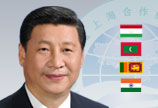Confucius Institute Day celebrated in Rome
By Alessandra Cardone (Xinhua) Updated: 2014-09-28 21:04ROME - Performers, students, and many Italian citizens interested in the Chinese culture and language took part in the Confucius Institute Day celebration held in Rome on Saturday.
The event, which took place worldwide for the 10th anniversary of the founding of Confucius Institutes, was celebrated in the historic Trastevere district, in the heart of Italian capital city.
 |
The Confucius Institute at La Sapienza University in Rome was the first to be established in Italy, and the second in Europe.
The initiative came at the end of a week-long celebration comprised of various events related to Chinese culture, language, and arts throughout the city.
Many stands offered a taste of Chinese traditions on Saturday, such as typical cuisine, traditional medicine, and Chinese martial arts, while martial art practitioners and singers performed on a stage.
The event kicked off with an acrobatic performance of Shaolin Kung Fu followed by performances of Tai Chi, Xinyi Liuhe Quan, and other martial arts.
Opera singer Yu Xiaoqing of the Santa Cecilia National Academy Orchestra in Rome sang a Dragon Boat melody.
Chinese Ambassador to Italy Li Ruiyu warmly greeted the people who came to watch the event.
"The Confucius Institute in Rome and the other nine established in Italy have contributed greatly to the cultural and humanistic exchange between Italy and China," he said.
Italian director of the Confucius Institute at La Sapienza University in Rome, Federico Masini, highlighted the successful exchange path covered so far.
"When we established the Confucius Institute in Rome eight years ago, many wondered how could we possibly bring together two cultures so different to each other. Today, thanks to the mutual openness, we proved that it can be done," Masini told Xinhua.
Scores of Italian students follow the courses at the Confucius Institute in Rome every year, and many Chinese teachers have a chance to come to Italy and have a work experience in a foreign university, Masini also said.
Yet, the exchange between Italians and Chinese would actually go beyond the pure language teaching, people said.
"I have been practising Tai Chi for five years now, and that is why I have also approached the study of the Chinese language," Piero Del Vecchio from Rome told Xinhua.
The man said a specific interest or goal would be usually needed in order to draw someone close to such a distant language.
"For some people, it is the hope to find more chances for their business, for students is the hope of a better future ... For me, it was Tai Chi, the wisdom I found in this discipline and the benefits it gave to my body and mind," Del Vecchio added.
When asked about what benefits would both Tai Chi and the learning of Chinese grant him, he laughed and said: "Well, first of all, nobody even guesses I am 71 now! As for the language, its calligraphy charms my mind. There is always a principle there, nothing is random."
From the opposite perspective of a 15-year-old boy, Luca Colacino just agreed with the older man. The teenager has been studying at the Confucius Institute in Rome for two years now.
"I like it because it feels so good to learn something nobody else knows, and also because you feel everything in the Chinese language has a meaning. The way you write, the way you express things ... Everything has an order there, and everything seeks perfection," Colacino told Xinhua.
The young student did not know yet where this path would bring him, but it must be something good.
"Of course, I hope the Chinese would help me finding a good job. Yet, I see benefits beyond this line: in these times, you only hear talks of war everywhere in the world, and you see diplomacy failing. I have chosen cultural exchange, because it is the only way to learn how to live and interact with the others," the student said.
Long-term benefits for Italian society were also in the mind of professor Masini.
"I think the cultural exchange with China would impact positively on our society as a whole, it will help Italy to get rid of its provincialism," Masini said.
"In the long term, it will thus contribute to prepare our future Italian citizens as more open-minded people," said Masini.










